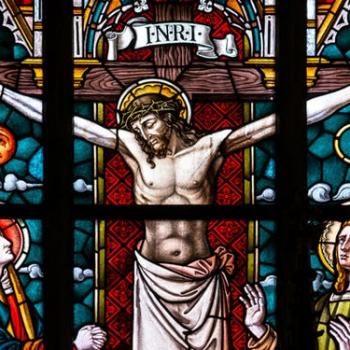Jason: There's a lot of debate within the Pagan movement about what "Pagan" really means. Is it a faith grouping or is it the name of a social movement? Paganism as an umbrella term is rapidly losing meaning, just as mainstream institutions are starting to become comfortable with it. Modern Paganism is more a series of Paganisms, and I try to make sure the majority of those Paganisms are being represented. Since Witches, Druids, Heathens, Atheo-Pagans, Polytheists, and all the other categories that make up our family sometimes don't have a lot in common, coming up with general topics that we can share amongst ourselves can be a challenge.
Dale: Atheism has the same issues. Prior experiences with religion differ dramatically. Few were raised in atheist homes, so there's usually a transition narrative to consider. Some have serious resentment toward religion because of painful experiences or even abuse, and those of us with fewer scars can be too dismissive of that pain. Anti-theists, on the other hand, often see the more accommodating atheists as religious lapdogs or "faitheists." This internecine bitterness can be worse than the external fights. But there are signs that it's getting better.
Bart: There are always identity, authority, and disciplinary issues for the Evangelical Channel, too. While we would all claim the same ultimate authority—the Bible—we come from different traditions that will sometimes disagree on what the Book says or how it should be applied. But for all the arguments that can be reduced to "who is in and who is out," there is a surprisingly clear baseline and commonality that characterizes the Evangelical world in general. I confess that I've often navigated the Evangelical "brand" by Justice Stewart's dictum regarding obscenity: "I know it when I see it."
Jennifer: My challenge is somewhat the opposite of Bart's. The faith and work conversation that birthed my channel has, in the last fifty years, been largely not only Evangelical but Reformed Evangelical. Furthermore, it's been largely white, male, and middle-class. Bringing new voices to that table, integrating them into the discussion, and reminding those within those boundaries that there are voices outside those boundaries with something to contribute is a high priority for me.
What challenges do you encounter from people of other religions or worldviews? How does the multi-perspective nature of Patheos help or hinder meeting that challenge?
Bart: Generally, the greatest challenge has been speaking different "languages"—we have different authorities, different life experiences, and different fears and regrets. Having the varied perspectives on Patheos teaches our participants to be cultural translators. I think it makes us better human beings to be more effective at explaining ourselves and to inculcate a greater patience in trying to understand others. While coming from each of our cultural or intellectual ghettos can lead to a lot of anger and frustration, it can also open the door to greater wisdom, firmer convictions, and abiding friendships. But all those benefits are put into jeopardy if you're obsessed with being in control of the conversation. I'd argue that love of control is what is most often the problem for discussing important matters with folks of different religious beliefs.
Nancy: Bart, I agree. Additionally, I think we don't have the same set of facts… it makes it nearly impossible to talk about issues. (The Planned Parenthood videos are a recent, good example.)
Kate: Beautifully said, Bart. Editing the Spirituality Channel is a great opportunity for me to stretch the boundaries of my own cultural conditioning as I, too, serve a widely diverse body of writers and readers. I don't need to step outside the perimeter of my own channel to bump up against "other" religions or worldviews. But that's the beauty of Patheos. "Hosting the conversation on faith" is like conducting a symphony that would otherwise devolve into cacophony.
Deborah: Someone, somewhere, almost every day, is going to get their buttons pushed at Patheos. And if we are true to our mission to host the whole conversation on faith online, that's what should be happening. We live too much in our own cultural and ideological bubbles. Patheos invites, no, demands, that we face our biggest perceived "enemies" and figure out how to respond, engage, respect, and maybe even challenge the other for the sake of world peace. Okay, that just got a little lofty, but ultimately, I do believe the conversation amongst us, if done well and intentionally, could save us.
Dilshad: Muslims, especially in this day and age, are the fastest to get fingers pointed at, pigeonholed and stereotyped. Sometimes, after reading what other faith bloggers on our site are writing about Muslims, I feel like saying to them, do you even read our channel? Are you getting to know us? Conversation between ourselves, done well as Deborah says, can save us. The Patheos model is built for that. We need to talk to each other, not at each other.




